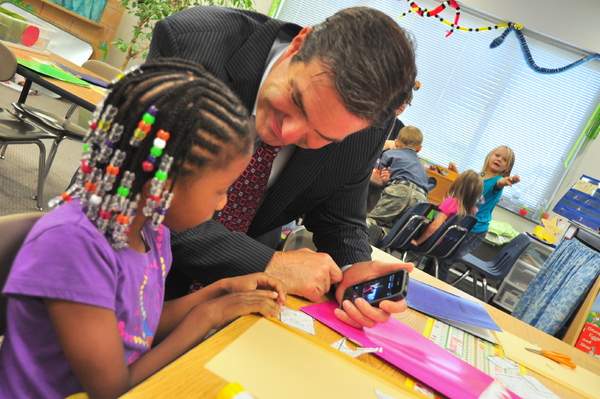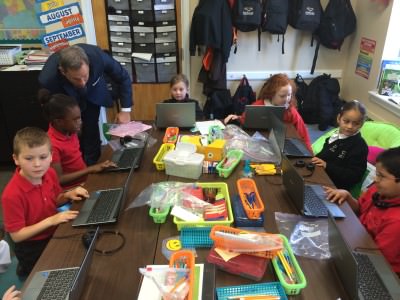

Every child deserves an effective education that truly prepares them for success. The data is crystal clear – those states with the greatest increase in educational outcomes are the states with the largest increases in the income of their people and businesses.
Gov. McCrory and I believe what most North Carolinians believe, that the purpose of an education is to gain the skills and knowledge that you need to get a job, earn money, and enjoy life.
When it comes to getting real results in education we must agree on 3 things:
First: No economy can grow faster than the rate at which the quality of its workforce improves.
Second: Our workforce can only improve when we have an education system that is preparing the next generation of leaders for the world of the future, not the past.
Third: We need to commit ourselves to being student focused. Our focus should be on the students and outcomes, not grown-ups and money.
The payoff from this investment is the future growth and economic vitality of our state.
But let’s talk about money for a minute. Targeted education investments in student engagement and real, measurable results are the best investments we can make in our workforce, and an investment in our workforce is the best investment we can make in our economy. The payoff from this investment is the future growth and economic vitality of our state. Despite the political rhetoric on both sides of the aisle, here are some of the education investments that North Carolina is making in its public schools:
- Since 2011, as we have continued to recover from one of the worst economic crises in our nation’s history, our state’s overall education spending has gone up every year.1
- North Carolina spends a higher percentage of tax revenues on higher education than any other state.2
- In the last session, we worked together with our Community College system to close the skills gap by reinvesting $15 million into the state’s 58 community colleges to train students and workers to compete for high demand, high skill, high wage jobs.3
- And last year, working side by side with teachers, students and parents, we invested over $300 million dollars into our most critical educational resource, our teachers.4 We passed one of the largest teacher raises in North Carolina history and began to modernize the way we reward our teachers so that they can earn more money faster and stay in the profession that develops our next generation of leaders.
So as we enter 2015 and embark upon a new legislative session in North Carolina, where do we go from here? Here are three major components of Gov. McCrory’ s educational vison for ensuring that every student, regardless of circumstance, is able to reach their potential.
We need more job-ready degrees and credentials faster and at less cost
In order to reach our potential we need to be put in real world situations and learn real world skills, and those skills and situations are always changing. Every 10 years, citizens have to learn a whole new set of skills if they want to compete in the workforce. We need to be lifelong learners and the goal of education must be to provide opportunities for us to quickly upgrade our skills and be able to prove it in the workplace.
In short, our challenge and our opportunity in education is that we need to move to a seamless, mastery based model in education. We need to change our model from one that is based on seat time in irrelevant courses that don’t apply to the real world, and bubble tests that don’t measure what matters most. We need more job-ready degrees faster and at less cost. We need to move urgently toward a model that gives us the skills to show what we know and what we can do.
Readers, teachers, and leaders are the key


Reading is the constant essential for success in life. We owe the General Assembly a debt of gratitude for shining a bright light on the need for every child to read by fourth grade through the Read to Achieve legislation. Leaders are readers and literacy is the key to success in any endeavor. We should continue to build on the Read to Achieve legislation by strengthening it in the next legislative session.
An overwhelming body of evidence and common sense tells us that the most critical factor in student’s success is the teacher in the classroom and the principal who leads the school. That’s why we need to continue to build a coherent talent pipeline so that education can be a career destination, not a layover.
Our shared goal should be developing a continuum of choices for prospective educators – from teaching through serving as principal – that clearly shows the career options they can pursue. These paths should lay out the expectations of them for pursuing those options, including the investment they should be expected to make in themselves and the resources and rewards they can expect to receive as the result of their performance and leadership.
Digital learning is a vital tool, and North Carolina can lead the way
Gov. McCrory believes we can be the first state in the nation to move to a digital learning environment where all students have one-to-one access to technology in their schools and in their home. We must to commit ourselves to digital learning access as a critical tool to achieving our educational goals for students, parents and teachers.
We can’t do it from Raleigh, and we can’t do it alone
The answers in education will come from every student, parent, teacher, principal, superintendent, and citizen of North Carolina, and one size does not fit all.
So those are three major components of the governor’s vision for education, but I would be remiss if I did not add one final and crucial point … solutions in education will not come from a politician or an education advisor, they won’t come from Raleigh and they certainly won’t come from Washington, D.C. The answers in education will come from every student, parent, teacher, principal, superintendent, and citizen of North Carolina, and one size does not fit all. We have a tremendous challenge and a tremendous opportunity to do the right thing for our students in North Carolina, and we must do it together.




